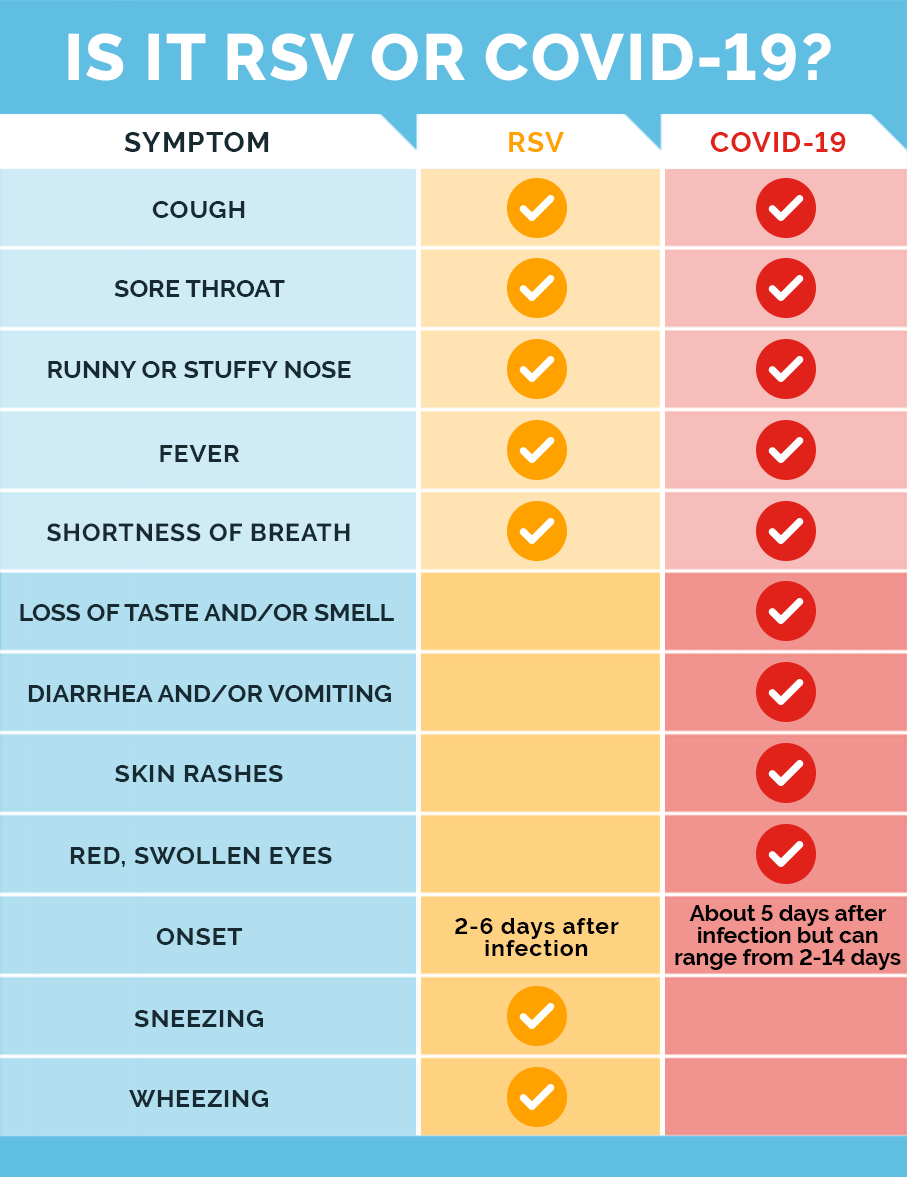what is rsv in babies covid
Congestion or runny nose. Respiratory syncytial virus RSV causes infections of the lungs and respiratory tract.

Rsv Respiratory Syncytial Virus Symptoms Causes Treatment Everyday Health
Respiratory syncytial sin-SISH-ul virus can also infect adults.

. Respiratory droplets are tiny sprays of water that come from your nose or. RSV is a common respiratory pathogen so common in fact that nearly all of us are infected with it by the age of two. In children a coronavirus infection tends to be mild.
For more information contact your health care. RSV is a common respiratory infection in young children that usually occurs in winter but this year it has been spreading during the summer. One of the many acronyms you might have come across while parenting your lovebug is RSV.
In very young infants less than 6 months old the only symptoms of RSV infection may be. RSV infection can be more serious in the neonatal period. Its so common that most children have been infected with the virus by age 2.
And for kids who are toddler-age and older symptoms tend to be mild like a common cold. Respiratory syncytial virus RSV is a common respiratory virus that usually causes mild cold-like symptoms. RSV is a seasonal virus that primarily affects children and its really common.
Overall the study. Young children and older adults especially those with certain underlying health conditions are at higher risk for severe illness from RSV. RSV is common in babies and children.
Almost all will have had it by the time they are two. In adults and older healthy children RSV symptoms are mild and typically mimic the common cold. In cases with suspected COVID-19 infection it should be kept in mind if atelectasis is seen on chest radiography.
Almost every child will get RSV by the age of 2 and for the majority of babies the illness is mild with symptoms lasting for about one or two weeks. Most kids have had the virus by the time they turn 2. Apnea pauses while breathing.
RSV is very contagious. RSVor respiratory syncytial viruscauses an upper respiratory infection. The bottom line.
However it can be dangerous for infants and elderly adults that are at a higher risk for lower respiratory tract infections. This is different from adults who can sometimes get RSV infections and not have symptoms. Kids with severe bronchiolitis caused by RSV are usually admitted to the hospital for supportive care like oxygen and intravenous IV fluids.
Trouble breathing or rapid breathing. Though COVID-19 can affect children adults make up most of the cases diagnosed so far. RSV symptoms range from mild to severe and commonly include.
The flu by influenza virus COVID-19 by SARS-CoV-2 virus and RSV by respiratory syncytial virus. For the vast majority. However babies 1 year and younger are much more susceptible to serious illness.
It usually shows up as a mild cold and lasts for five to seven days. It may cause a cough or cold but for some it can lead to bronchiolitis an inflammatory infection of the. For many children a rash known as COVID toes may be the only sign of a coronavirus infection.
It is possible for a person to be infected with multiple viruses at the same time. RSV is a common highly contagious seasonal respiratory virus resulting in mild cold-like symptoms that typically subside in a week or two for healthy children and adults. Respiratory syncytial virus or RSV is a viral infection common in children.
The newest one is the virus that causes COVID-19. It spreads when a cough a sneeze or even a loud conversation sends respiratory droplets flying through the air. Adults are also more likely to have serious symptoms from.
Infants who get an RSV infection almost always show symptoms. In children with suppressed immunity the mortality rate is higher about 60 percent. Do babies get a rash with Covid.
It spreads between babies children and older people in respiratory droplets similar to the way coronavirus and influenza spread. Respiratory syncytial virus is a common and very contagious virus that infects the respiratory tract of most children before their second birthday. What Is Respiratory Syncytial Virus RSV.
The flu COVID-19 and respiratory syncytial virus RSV are all highly contagious respiratory infections caused by viruses. RSV is a contagious virus thats spread just like the common cold often between October and April. What are the signs and symptoms of RSV.
Respiratory syncytial virus RSV is a very common respiratory illness that can present with a runny nose fever wheezing and a cough. What is RSV. Presence of severe underlying comorbidities such as neuromuscular.
The mortality rate of RSV in babies depends on the immunologic status of the child which resembles the following. A retrospective study published in 2020 analyzed data from 862 patients at two medical centers in Chicago who tested positive for COVID-19 from. Respiratory failure may be more serious in RSV positive infants and RSV infection may be more dangerous for the neonatal period.
Symptoms in babies present as Covid as parents warned of winter virus surge. Reports of kids developing both a respiratory syncytial virus RSV infection and COVID-19 have increased in recent weeks in. People over the age of 50 or those with heart or lung disease are also at risk for complications and they can catch RSV from babies toddlers and older kids.
In adults and older children RSV is. Sometimes making sense of your kiddos health can feel a little like wading through alphabet soup. A study on adult women and infants in British Columbia Canada demonstrated that the humoral immunity against the respiratory syncytial virus RSV has significantly reduced.
It can spread to the lower respiratory tract causing pneumonia or bronchiolitis. In healthy children the reported mortality rate is about 05 to 17 percent. What is RSV in babies.
Prophylaxis is available for children who qualify. A little-known disease called RSV with symptoms similar to a cold and elements easily mistaken for Covid puts thousands. In infants RSV can cause pneumonia or bronchiolitis an inflammation of the small airways in the lungs.
Of those 11 four had RSV in addition to COVID-19. There are vaccines and treatments specifically for COVID-19 but none for RSV.

Respiratory Syncytial Virus Rsv National Foundation For Infectious Diseases

Spotting The Difference Between A Common Cold And Rsv Children S National
Understanding The Difference Between Rsv And Covid 19 Rainbow Pediatrics Rainbow Pediatrics
Rsv Cold Covid 19 Flu How To Id Common Kid Bugs

Bronchiolitis And Rsv After Hours Kids Pediatric Clinic

Respiratory Syncytial Virus Rsv National Foundation For Infectious Diseases

Viral Concerns Keep Your Children Safe From The Rsv Virus Lee Health
The Medical Minute What Parents Need To Know About A Rise In Rsv Penn State University
Why Is Rsv On The Rise This Summer
Rsv In Babies Symptoms Prevention Resemblance To Covid 19 Immunifyme
/cloudfront-us-east-1.images.arcpublishing.com/gray/FWAOGGYBHRHWPNYGWUCTQ7DKLY.jpg)
How To Tell The Difference Between Rsv And Covid 19

Impact Of Coronavirus Covid 19 On Special Intensive Care For Newborns A Parents Perspective Efcni

Israel Expands Vaccination Campaign For Premature Babies Following Spike In Rsv Www Israelhayom Com

The Impact Of Visitation Restrictions In The Nicu During Covid 19 Efcni

Respiratory Syncytial Virus Rsv What Do I Need To Know Hsc Public Health Agency
/cloudfront-us-east-1.images.arcpublishing.com/gray/FWAOGGYBHRHWPNYGWUCTQ7DKLY.jpg)
How To Tell The Difference Between Rsv And Covid 19

